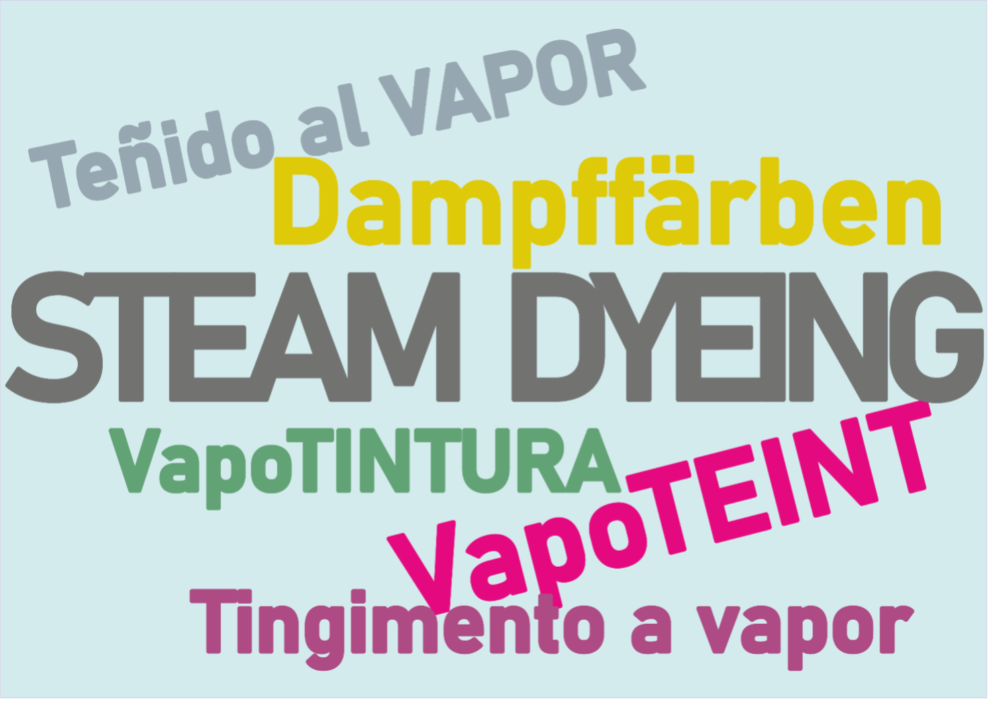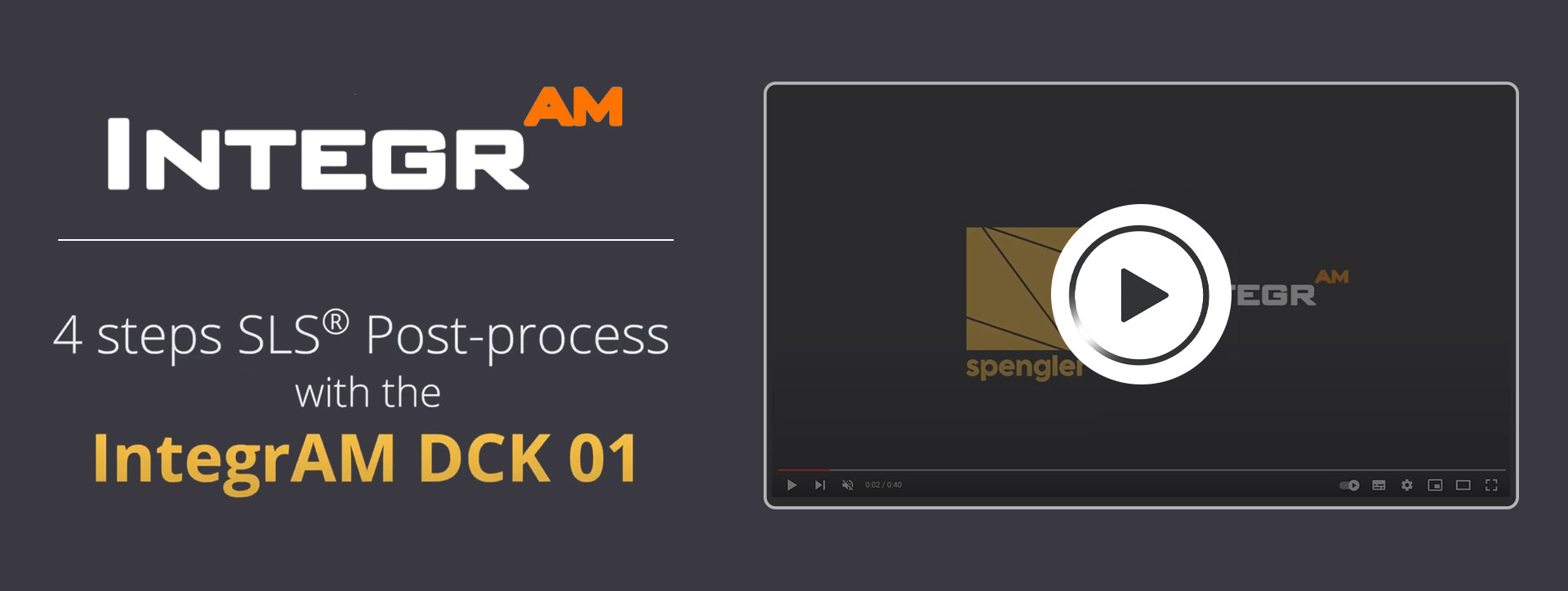Steam DYEING® is a revolutionary way to apply colour to a plastic component, a polymer or an elastomer. Its story begins in the field of the Additve Manufacturing, or 3D printing of polymers, composite materials or elastomers. Suitable parts are manufactured, just to make an example, with SLS (Selective laser Sintering), Multi-Jet Fusion™ (MJF) by Hewlett-Packard and other similar technologies using, additive powders like PA12, PA11, also charged with glass, TPU, PEEK, BIO-Polymers and similar powders.
Some of them are premixed with nano technologic fibers, like carbon fibers, offering light weight combined with extraordinary mechanical resistance, with final look inhomogeneous.

The classic dyeing method
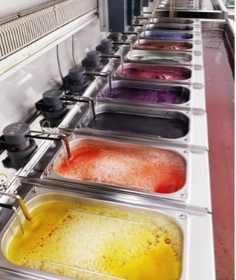
The most popular and classic dyeing method is using water, pre-mixed with dyeing colour, heated to a temperature in the range of 80° – 90°C, into a suitable stainless steel tank.
The plastic components to be dyed, are submerged into the liquid for a certain time.
The typical ratio of colour/water is generally: 1/10 of colour + 9/10 of water.
To produce a volume of about 5 to 10 liters of plastic components, a suitable tank is generally of about 30 liters volume, where 3 kg. of colour are added to 27 liters of water.
Part of the pigments contained into the dyeing colours are passing by the pre-mixed liquid to the surface of the parts, therefore a second application would need to be integrated by new dyeing colours.
The operation is mainly done by experience, with dosage/re-integration of colour by hand, with lot of competence depending almost on the operator skills.
The innovative Steam DYEING® method, by IntegrAM
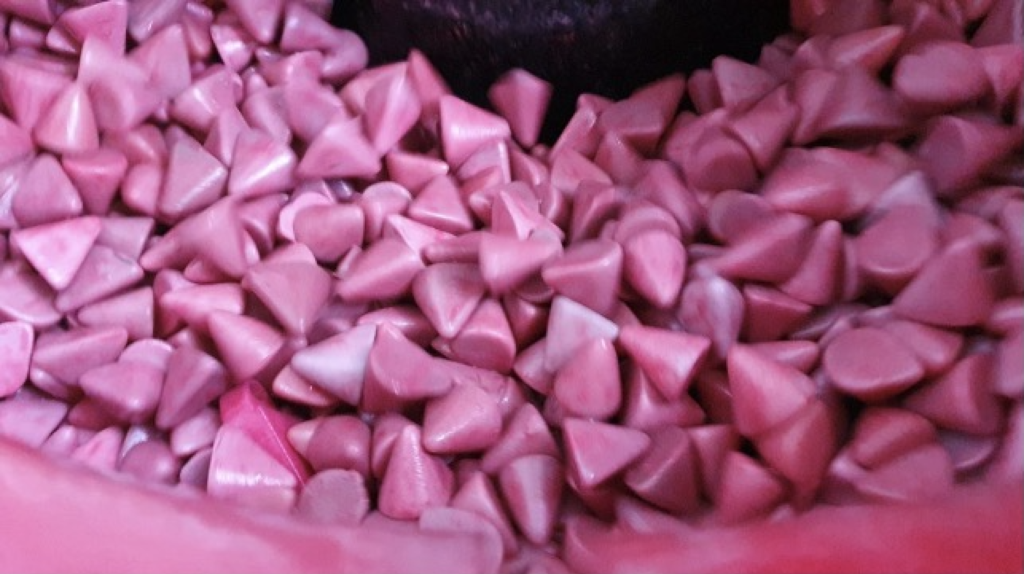
Steam DYEING® is a technology based on the use of DRY SATURATED STEAM, duly mixed with a very small quantity of dyeing colour (compared with the classic method above described), where parts are “sprayed” by the steam, and not submerged into a big volume of water.
The parts are also continuously moved in a three-dimensional circular loop, in order to be exposed several times to the Steam Nozzle, in the beginning to be heated up and, in a second time after reaching the suitable temperature, to be dyed by STEAM+DYEING COLOUR.
Instead of a stainless steel tank, the Steam DYEING® process is happening into a circular bowl of a vibratory finishing machine, made of special type of polyurethane, specially adapted to do the Steam DYEING®, thanks to the revolutionary design SM3 by Rollwasch®.
Additionally, inside the working bowl are loaded special elastic media, that maybe pyramid or cones or ellypses of several sizes, named QF MEDIA (Patented by Rollwasch®).
Those kind of MEDIA are extremely delicate, they have just a “vectorial” function to move three dimensionally the components to be dyed into the working bowl and, with the use of a special gel, between one process and a second one, in case of change of colour, they can be automatically cleaned.

The work flow of a Steam DYEING® machine, available in capacities of 25, 50 and 120 liters, is generally:
JUST STEAM DYEING® PLASTIC COMPONENTS
The operator does the parts loading, cover closure, activation of the wished recipe;
Example of recipe – all happens in full automatic mode:
5 minutes heating with combination of hot air+steam
5 minutes Steam DYEING of red colour
5 minutes Drying with hot air
The operator opens the cover, does the parts unloading;
Parameters reported in this and the following examples are just to make an example – data could change depending on parts geometry, quantity, material, start temperature, humidity, etc.
STEAM DYEING® WITH A NEW COLOUR, RESPECT TO THE PREVIOUS CYCLE
The operator does the parts loading, cover closure, activation of the wished recipe;
Example of recipe with colour change – all happens in full automatic mode:
10 minutes media cleaning with special gel
5 minutes rinsing of the gel by the media, by the parts and by the working bowl
5 minutes heating with combination of hot air+steam
5 minutes Steam DYEING of red colour
5 minutes Drying with hot air
The operator opens the cover, does the parts unloading;
STEAM DYEING® PARTS THAT NEED TO BE SMOOTHED
The operator does the parts loading, cover closure, activation of the wished recipe;
Example of recipe with SMOOTHING CYCLE – all happens in full automatic mode:
90 minutes parts smoothing with special gel
5 minutes rinsing of the gel by the media, by the parts and by the working bowl
5 minutes heating with combination of hot air+steam
5 minutes Steam DYEING of red colour
5 minutes Drying with hot air
The operator opens the cover, does the parts unloading;
The classic dyeing method,
Compared to the Steam DYEING®
to dye 5 – 10 l. volume of plastic parts
CLASSIC METHOD | Steam DYEING® |
27 liters of water needed | About 1 to 1,5 liters of water needed, to generate the dry saturated steam |
3 kg. of liquid dyeing colour needed | 0,13 to 0,3 kg. of liquid dyeing colour needed |
Waste produced: 30 liters | Waste produced: 1,13 to 1,8 liters – from 16,6 to 26,5 times less waste produced! |
Skillfull operator needed (!) | Any operator can do the Steam DYEING® |
Repeatability depending on the operator | Repeatability assured by recipes, automation, technology |
Concept of the seventies, still alive just because of skillfull operators, near to retirement | Modern technology, open to the challenge of future generations, easy to manage and with Return Of Investment in brief, thanks to reduced production of waste, reduced consumption of dyeing colours |
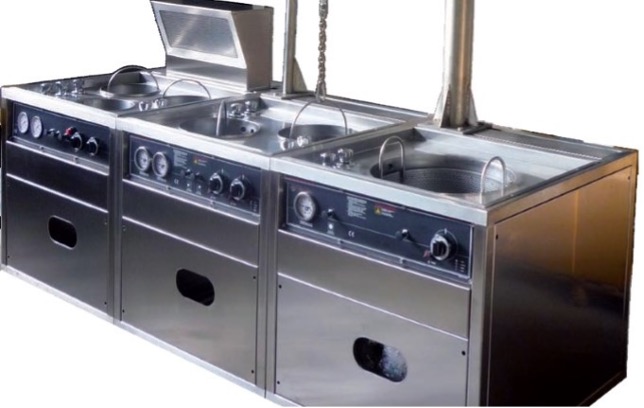
The today technology offered by well made ultrasonic systems, with stainless steel tanks, based over 1 dyeing (heated) tank + 1 rinsing tank + 1 drying oven, in total, could have an equivalent investment or even majour respect to a Steam DYEING® system complete.
Possibly, also in space, the afore said configuration of a “classic” solution, could even need more than a Steam DYEING® unit of equivalent capacity.
The Steam DYEING® R&D project, in pills
With the contribution of DCL (Dyeing Colour Lab), in joint activity with IntegrAM,
DCL (Dyeing Colour Lab) is the coordination Lab, supported and supervised by the Know How of Rollwasch Chemical Division, who produces chemical compounds for surface finishing since 1950 – with specific target for the IntegrAM Additive Manufacturing field
2019 –0– Conception and Vision by Techno Surface
2020 –0– Patent demand by Techno Surface
2020-21 –0– Experiments, trials, tuning
2022 –0– Construction at Rollwasch of unit#1
2023 –1– Unit#1 at DCL for Year 1 of R&D (Black)
2024 –2– Unit#1 at DCL for Year 2 of R&D (Colours)
2025 –3– Unit#1 at DCL for Year 3 of R&D (Budget)
The START flag to go out on the market with the first machines dedicated to the black colour takes place at the beginning of October 2023, the date on which the results consolidated from over five years of research, finds the first concrete and repeatable results based on the combination of multiple technologies of excellence.
During 2023, over 60 documented tests with process parameters, formulation changes, adaptations and variants allowed three fundamental levels of quality to be achieved:
- repeatability of results, based on fully automatic recipes (as option, industry 4.0 compliants)
- homogeneity and depth of the applied color based on top quality of DCL formulations
- high containment of the quantities of water and colors used, with consequent drastic reduction in waste production
Why IntegrAM
IntegrAM is a network of specialists, an excellence in terms of innovation, R&D, know how and multidisciplinary solutions.
The IntegrAM brand includes, as far as Steam DYEING® technology is concerned:
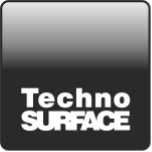
Techno Surface, an Italian company founded in 2015 and specialized in various technologies, with strong convergence towards Additive Manufacturing.
As far as the Steam DYEING® technology is concerned, Techno Surface had the original idea in 2019, that has experienced the efficient interaction between dry saturated steam and dyeing colour on the surface of polymers made by 3D printing
Techno Surface decided in 2020 to protect this peculiar technology with a Patent Demand. Since the beginning the partners for this project has been Rollwasch®, who offered to be the manufacturer of the first prothotype and, then the R&D activity assigned to (Dyeing Colour Lab).

Rollwasch®, an Italian company founded in 1950 in Milan and specialized in surface treatment. Manufacturer of machines and consumer finishing products.
The reliable partner to produce the special range of machines dedicated to the Additive Manufacturing field for Techno Surface;
Since 2019 Rollwasch® has be one of the founding members of the IntegrAM network, beeing available also to provide its test room (for trials with participation to the costs), its after sales support for technical assistance and its participation to some challenging projects like the DCK ALL IN ONE, Patented from Rollwasch® and distributed by the IntegrAM network.

DCL (Dyeing Colour Lab) is the competent reference point selected by the companies part of the IntegrAM network, to supervise and manage the innovative program of pigments and colours involved in the Steam Dyeing technology.
Rollwasch® has, inside its own organization, a very expert chemical manufacturing unit where the DCL Lab is just a specific area of its labs, destinated to support all the products related to the Dyeing technology, for the full network of companies part of IntegrAM.
For any doubt, dyeing test, information, feel free to get in touch with:
info@integram.eu
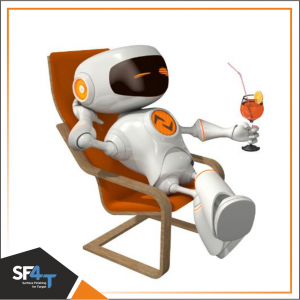
XPERT
Spencer Williams
integram.team@gmail.com
CATEGORIES
Technology:
Post Process & Finishing for AM, Dyeing, Powder recovery & selection, Surface Finishing, Unpacking or Decaking, Coating
Specific category:
Post Process & Finishing for AM; Scientific Head of R&D; Webinars & Seminars; Circular Economy Technology;
COMPANY
IntegrAM
www.integram.eu



